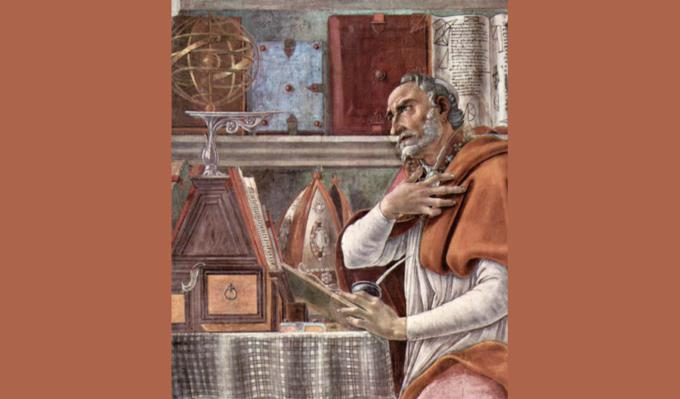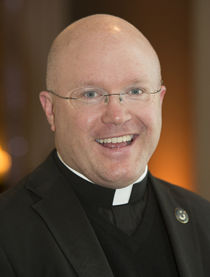
Faith
In 2007, Pope Benedict concluded his homily in Pavia by quoting Augustine's words, "The whole Church -- all of us, including the Apostles -- must pray every day: forgive us our trespasses as we forgive those who trespass against us."

Landry
When Pope Benedict traveled to Pavia in 2007 to pray at the tomb of his theological mentor and inspiration St. Augustine, he focused on how the great fourth- and fifth-century doctor was "one of the greatest converts in the history of the Church."
But what he meant is not just the event Augustine writes about in his famous "Confessions" of giving up an unchaste life for a chaste one and accepting the commitments of Christian baptism.
Benedict spoke, rather, of Augustine's "three conversions."
The second life-changing turnaround happened a few years after the first. Augustine was living happily in a small monastery he had founded, praying, writing some valuable philosophical and theological works, and dwelling in community according to a rule he himself had written. He went to visit a friend in Hippo, whom he was hoping to recruit to the monastery.
At Sunday Mass together, Bishop Valerius, a native Greek speaker, asked his people to pray that he could find a priest who could preach to them in their familiar Latin. They grabbed hold of the famous Latin orator in their midst trying to compel him to accept priestly ordination and that preaching task. Even though it was something he did not desire, since it would require leaving the monastery, giving up his contemplative life, and spend his day tending to the basic spiritual needs of widows, orphans, and others in need, he accepted.
Pondering St. Paul's words, "Christ died for all, so that those who live should not live for themselves, but for him who died for them" (2 Cor 5:15), Augustine recognized he needed to convert anew. At a practical level, it meant trading writing erudite manuscripts for the educated in order to give homilies and catecheses to simple people. But that's what he freely did.
The third conversion happened very late in life, when Augustine, reviewing his priestly output, recognized that he had been far too focused on human action rather than on divine mercy received with humility.
Pope Benedict's homage to his hero's lifetime journey of continued conversion provides a means to understand two conversions we see in his life with regard to the papacy.
The first of Benedict's papal conversions had to do with the assumption of the office.
He had eagerly looked forward to retiring from his service as prefect of the Doctrine of the Faith upon the death of St. John Paul II so that he might return to Germany with his priest brother and finish various theological works he was burning to have the time to write. But when his brother cardinals elected him, at 78 years of age, the 264th successor to Peter, he like Augustine, needed to convert his plans to the Lord's -- and change his writing.
Prior to the papacy, he wrote scores of books and articles for theology students and gave scholarly addresses to highly intelligent listeners. Much of his professional work in the Vatican required sophisticated criticism of wayward ideas and trends. And other than his four years as archbishop of Munich-Freising when, like Augustine, he needed to sacrifice his personal interests for pastoral care, the rest of his priestly life was happily spent as an academic of international renown.
Becoming pope, he needed to make a dramatic shift in his priorities in order to focus on the principle duty of the pope to pass on, as of the greatest importance, the faith of the Church (1 Cor 15:3). So he dedicated himself to transmitting the basics, the foundations, of Christian faith and life.
He wrote two encyclicals on charity (2005, 2009), another on hope (2007), a third on faith (2013, published by Pope Francis as a joint project), an exhortation on the Eucharist (2007), and another on the Word of God (2011).
He celebrated Holy Years dedicated to the Eucharist, St. Paul, the Priesthood, and faith.
He dedicated catechetical series to the Psalms and Canticles of the Liturgy of the Hours, the apostles, the Fathers and Doctors of the Church, St. Paul's life and writings, great male and female saints, prayer and faith.
He gave regular talks to young people and great annual addresses to children.
While he still used his vacation time to work on a trilogy dedicated to Jesus of Nazareth, each volume got increasingly simpler, influenced doubtless by his experiences as pope.
The universal Church became his Hippo, and he converted his intellectual gifts toward the pastoral needs of his people.
We could also say that late in life Pope Benedict experienced a similar conversion to what he described as Augustine's final one: a total entrustment to God's mercy.
For Pope Benedict, that meant surrendering the daily work of the papacy to devote himself full time to imploring God's mercy for himself and the Church. That's what he did for almost a decade in the monastery of Mater Ecclesiae in the Vatican.
In 2007, Pope Benedict concluded his homily in Pavia by quoting Augustine's words, "The whole Church -- all of us, including the Apostles -- must pray every day: forgive us our trespasses as we forgive those who trespass against us."
He commented that by that point Augustine had learned not only "the humility of integrating his great thought into the humble faith of the Church, not only the humility of translating his great knowledge into the simplicity of announcement, but also the humility of recognizing that he himself and the entire pilgrim Church needed and continually need the merciful goodness of a God who forgives every day."
The bishop of Hippo's spiritual son, the bishop of Rome, learned and lived those three degrees of humility and every day prayed for God's merciful goodness.
On the day he died, Pope Francis thanked him "above all for [this] witness of faith and prayer, especially in these last years of his recollected life," saying "only God knows the value and power of his intercession ... offered for the good of the Church."
We pray that all of us in the Church will learn from Augustine and Benedict these lessons of continual conversion, humility and prayer, as we express our hope that these two greats have been united in common prayer in the monastery of the house of the Father -- imploring that God's merciful goodness will continue to be poured out over the whole Church.
- Father Landry is a priest of the Diocese of Fall River who is national chaplain to Aid to the Church in Need USA, a Papal Missionary of Mercy and a Missionary of the Eucharist for the US Bishops.
Recent articles in the Faith & Family section
-
Did you know?Father Robert M. O'Grady
-
Sowing the Seeds of FaithMaureen Crowley Heil
-
Bread left overScott Hahn
-
Scripture Reflection for July 28, 2024, Seventeenth Sunday in Ordinary TimeJem Sullivan
-
What the universal call to holiness entailsDr. R. Jared Staudt





